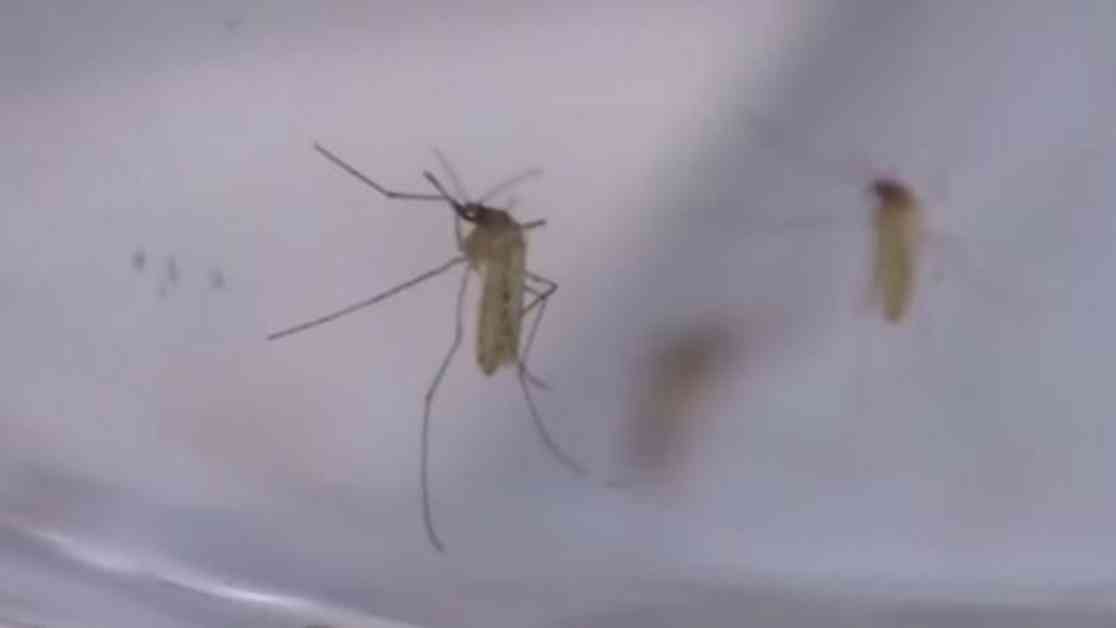The Massachusetts Department of Public Health (DPH) and the Massachusetts Department of Agricultural Resources (MDAR) have announced plans to conduct aerial spraying for mosquitoes in areas of Plymouth County and truck-mounted spraying in parts of Worcester County. This decision comes as a response to the heightened risk of Eastern Equine Encephalitis (EEE) in the state.
A total of 10 communities in Massachusetts have been classified as high or critical risk for the EEE virus by the DPH. In an effort to mitigate the spread of the disease, the State Reclamation and Mosquito Control Board (SRMCB), with the assistance of MDAR, will oversee the aerial and ground spraying operations.
The eight communities in the aerial spray zone include Carver, Halifax, Kingston, Middleborough, Plymouth, Plympton, Rochester, and Wareham. On the other hand, the five communities in the truck spray zone are Douglas, Dudley, Oxford, Sutton, and Uxbridge. Residents in these areas should stay informed about the spraying schedule, as it is expected to take place during the week of August 26, with operations commencing shortly after dusk and concluding in the early morning hours.
It is important to note that the spraying schedule is subject to change depending on weather conditions, and residents are advised to visit the DPH website for updated information. EEE is a rare but serious disease that can be fatal, affecting individuals of all ages. The recent case of EEE virus infection in a male in his 80s in Worcester County serves as a reminder of the risks associated with the disease.
During the last EEE outbreak in Massachusetts from 2019 to 2020, there were 17 human cases and seven deaths attributed to the virus. The use of Anvil 10+10, an EPA-registered pesticide, has been deemed effective in controlling mosquito populations in both ground-level and aerial spraying operations in the U.S. for over two decades.
Understanding EEE and Its Risks
Eastern Equine Encephalitis (EEE) is a rare but potentially fatal disease caused by the EEE virus, which is transmitted to humans through the bites of infected mosquitoes. While most cases of EEE are asymptomatic, severe cases can result in encephalitis, an inflammation of the brain that can lead to neurological complications and even death.
Symptoms of EEE typically appear 4 to 10 days after being bitten by an infected mosquito and may include fever, headache, chills, and muscle aches. In severe cases, individuals may experience disorientation, seizures, and coma. Due to the seriousness of the disease, it is crucial to take preventive measures to reduce the risk of exposure to mosquitoes carrying the EEE virus.
Preventive Measures for EEE
To protect yourself and your loved ones from EEE, it is important to take proactive steps to prevent mosquito bites and reduce mosquito breeding grounds. Here are some recommended preventive measures:
1. Use insect repellent: Apply EPA-registered insect repellent containing DEET, picaridin, IR3535, oil of lemon eucalyptus (OLE), or para-menthane-diol (PMD) to exposed skin and clothing.
2. Wear protective clothing: Wear long sleeves, pants, and socks when outdoors, especially during dawn and dusk when mosquitoes are most active.
3. Avoid outdoor activities during peak mosquito hours: Limit outdoor activities during dawn and dusk when mosquitoes are most active.
4. Remove standing water: Eliminate sources of standing water around your home, such as flower pots, bird baths, and clogged gutters, as they can serve as breeding grounds for mosquitoes.
5. Install or repair screens: Ensure that windows and doors are equipped with screens to prevent mosquitoes from entering your home.
By following these preventive measures, you can reduce your risk of exposure to mosquitoes carrying the EEE virus and protect yourself from potential infection.
Importance of Aerial and Ground Spraying
Aerial and ground spraying for mosquitoes play a crucial role in controlling mosquito populations and reducing the risk of mosquito-borne diseases like EEE. Aerial spraying involves the use of aircraft to disperse insecticides over large areas, while ground spraying utilizes truck-mounted equipment to apply insecticides to targeted areas.
The decision to conduct aerial and ground spraying in Plymouth and Worcester Counties is a proactive measure to reduce the mosquito population and prevent the spread of the EEE virus. By targeting areas with high mosquito activity and EEE risk, authorities aim to limit the potential transmission of the virus to humans and minimize the impact of the disease on public health.
The pesticide used in the spraying operations, Anvil 10+10, has been extensively tested and proven effective in controlling mosquitoes for over two decades. Its use in both aerial and ground spraying operations has been regulated by the EPA to ensure the safety and efficacy of the product in controlling mosquito populations.
Community Response and Public Health Awareness
As authorities prepare for aerial and ground spraying in Plymouth and Worcester Counties, it is essential for residents to stay informed about the spraying schedule and take necessary precautions to protect themselves from mosquito bites. Public health awareness and community response are key components in preventing the spread of mosquito-borne diseases like EEE.
Residents in the affected communities should follow updates from the DPH and local health departments regarding the spraying schedule and any additional preventive measures recommended by health officials. By working together to reduce mosquito populations and minimize the risk of EEE transmission, communities can help safeguard public health and prevent the spread of mosquito-borne diseases.
In conclusion, the upcoming aerial and ground spraying operations in Plymouth and Worcester Counties highlight the importance of proactive mosquito control measures in preventing the spread of EEE and protecting public health. By implementing preventive measures, staying informed about the risks of EEE, and supporting community efforts to reduce mosquito populations, residents can contribute to a safer and healthier environment for all.


